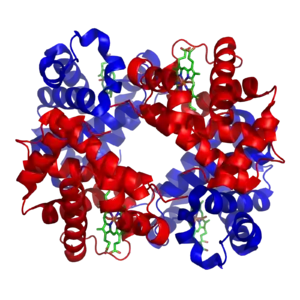Mean corpuscular hemoglobin
The mean corpuscular hemoglobin, or "mean cell hemoglobin" (MCH), is the average mass of hemoglobin (Hb) per red blood cell (RBC) in a sample of blood. It is reported as part of a standard complete blood count. MCH value is diminished in hypochromic anemias.[1]
It is calculated by dividing the total mass of hemoglobin by the number of red blood cells in a volume of blood.
MCH=(Hb*10)/RBC[2]
A normal MCH value in humans is 27 to 31 picograms (pg)/cell. The amount of hemoglobin per RBC depends on hemoglobin synthesis and the size of the RBC.
The mass of the red cell is determined by the iron (as part of the hemoglobin molecule), thus MCH in picograms is roughly the mass of one red cell. In iron deficiency anemia the cell mass becomes lighter, thus a MCH below 27 pg is an indication of iron deficiency.
The MCH decreases when Hb synthesis is reduced, or when RBCs are smaller than normal, such as in cases of iron-deficiency anemia.[1] Conversion to SI-units: 1 pg of hemoglobin = 0.06207 femtomole (fmol).[3] Normal value converted to SI-units: 1.68 – 1.92 fmol/cell.
See also
- Red blood cell indices
- Mean corpuscular hemoglobin concentration
- Mean corpuscular volume
References
- "MedlinePlus Medical Encyclopedia: RBC indices". Retrieved 2009-03-03.
- "Mean Cell Hemoglobin". Archived from the original on 2004-11-20. Retrieved 2009-03-03.
- Niemand, Hans Georg; Arnold-Gloor, Susi (2006). Praktikum der Hundeklinik (10 ed.). p. 102. ISBN 978-3-8304-4141-0.
